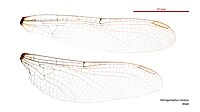| Black vicetail | |
|---|---|
|
Scientific classification
| |
| Domain: | Eukaryota |
| Kingdom: | Animalia |
| Phylum: | Arthropoda |
| Class: | Insecta |
| Order: | Odonata |
| Infraorder: | Anisoptera |
| Family: | Gomphidae |
| Genus: | Hemigomphus |
| Species: | H. atratus
|
| Binomial name | |
| Hemigomphus atratus | |

| |
| Synonyms | |
|
Austrogomphus atratus Watson, 1991 | |
Hemigomphus atratus is a species of dragonfly of the family Gomphidae, [3] known as the black vicetail. [4] It is endemic to north-eastern Queensland, Australia, where it inhabits rainforest streams. [5] [6]
Hemigomphus atratus is a small, black and yellow dragonfly. [4] Very little other information is known of this species, all of it coming from a single specimen found living at a freshwater stream near Tinaroo Dam, in north-eastern Queensland. [1]
The species name atratus is a Latin word meaning clothed in black. Tony Watson named this species of dragonfly after its blackish brown abdomen. [2] [7]
-
Male wings
- ^ a b Hawking, J.; Theischinger, G. (2006). "Hemigomphus atratus". IUCN Red List of Threatened Species. 2006: e.T59698A11973336. doi: 10.2305/IUCN.UK.2006.RLTS.T59698A11973336.en. Retrieved 17 November 2021.
- ^ a b Watson, J.A.L. (1991). "The Australian Gomphidae (Odonata)". Invertebrate Taxonomy. 5 (2): 289–441 [313]. doi: 10.1071/IT9910289.
- ^ Watson, J. A. L. (2012). "Species Hemigomphus atratus Watson, 1991". Australian Faunal Directory. 5. Australian Biological Resources Study: 289–441. Retrieved 19 February 2017.
- ^ a b Theischinger, Günther; Hawking, John (2006). The Complete Field Guide to Dragonflies of Australia. Collingwood, Victoria, Australia: CSIRO Publishing. p. 190. ISBN 978-0-64309-073-6.
- ^ Theischinger, Gunther; Endersby, Ian (2009). Identification Guide to the Australian Odonata. Department of Environment, Climate Change and Water NSW. p. 219. ISBN 978-1-74232-475-3.
- ^ Watson, J.A.L.; Theischinger, G.; Abbey, H.M. (1991). The Australian Dragonflies: A Guide to the Identification, Distributions and Habitats of Australian Odonata. Melbourne: CSIRO. p. 278. ISBN 0643051368.
- ^ Endersby, I. (2012). "Watson and Theischinger: the etymology of the dragonfly (Insecta: Odonata) names which they published". Journal and Proceedings of the Royal Society of New South Wales. 145 (443 & 444): 34–53 [37]. doi: 10.5962/p.146542. ISSN 0035-9173 – via Biodiversity Heritage Library.
| Black vicetail | |
|---|---|
|
Scientific classification
| |
| Domain: | Eukaryota |
| Kingdom: | Animalia |
| Phylum: | Arthropoda |
| Class: | Insecta |
| Order: | Odonata |
| Infraorder: | Anisoptera |
| Family: | Gomphidae |
| Genus: | Hemigomphus |
| Species: | H. atratus
|
| Binomial name | |
| Hemigomphus atratus | |

| |
| Synonyms | |
|
Austrogomphus atratus Watson, 1991 | |
Hemigomphus atratus is a species of dragonfly of the family Gomphidae, [3] known as the black vicetail. [4] It is endemic to north-eastern Queensland, Australia, where it inhabits rainforest streams. [5] [6]
Hemigomphus atratus is a small, black and yellow dragonfly. [4] Very little other information is known of this species, all of it coming from a single specimen found living at a freshwater stream near Tinaroo Dam, in north-eastern Queensland. [1]
The species name atratus is a Latin word meaning clothed in black. Tony Watson named this species of dragonfly after its blackish brown abdomen. [2] [7]
-
Male wings
- ^ a b Hawking, J.; Theischinger, G. (2006). "Hemigomphus atratus". IUCN Red List of Threatened Species. 2006: e.T59698A11973336. doi: 10.2305/IUCN.UK.2006.RLTS.T59698A11973336.en. Retrieved 17 November 2021.
- ^ a b Watson, J.A.L. (1991). "The Australian Gomphidae (Odonata)". Invertebrate Taxonomy. 5 (2): 289–441 [313]. doi: 10.1071/IT9910289.
- ^ Watson, J. A. L. (2012). "Species Hemigomphus atratus Watson, 1991". Australian Faunal Directory. 5. Australian Biological Resources Study: 289–441. Retrieved 19 February 2017.
- ^ a b Theischinger, Günther; Hawking, John (2006). The Complete Field Guide to Dragonflies of Australia. Collingwood, Victoria, Australia: CSIRO Publishing. p. 190. ISBN 978-0-64309-073-6.
- ^ Theischinger, Gunther; Endersby, Ian (2009). Identification Guide to the Australian Odonata. Department of Environment, Climate Change and Water NSW. p. 219. ISBN 978-1-74232-475-3.
- ^ Watson, J.A.L.; Theischinger, G.; Abbey, H.M. (1991). The Australian Dragonflies: A Guide to the Identification, Distributions and Habitats of Australian Odonata. Melbourne: CSIRO. p. 278. ISBN 0643051368.
- ^ Endersby, I. (2012). "Watson and Theischinger: the etymology of the dragonfly (Insecta: Odonata) names which they published". Journal and Proceedings of the Royal Society of New South Wales. 145 (443 & 444): 34–53 [37]. doi: 10.5962/p.146542. ISSN 0035-9173 – via Biodiversity Heritage Library.

